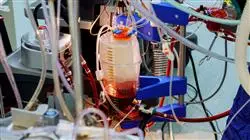University certificate
The world's largest faculty of medicine”
Why study at TECH?
With this Postgraduate diploma in Patient Blood Management in Surgical Patient, you will delve into the intraoperative techniques that contribute to blood saving and the improvement of critical patients"

Preoperative anemia is a known independent risk factor for morbidity and mortality in surgical patients, so it is necessary to implement hospital circuits for its early detection prior to the scheduling of surgery. In this way, strategies for improving red blood cell mass can be applied early without causing unnecessary delays in the scheduling of surgery, in addition to being able to identify other factors that may favor bleeding complications, such as anticoagulation and antiplatelet therapy.
On the other hand, different situations may arise in the operating room: scheduled and well optimized patients or urgent surgeries, in both situations acute bleeding may occur or be the main cause of the surgery. Hence the importance of knowing the different factors involved in hemostasis and their monitoring, since with the appropriate knowledge, specific and early treatment will be carried out. In the same way, it is important to understand in depth the different intraoperative methods and techniques that contribute to blood saving, which can be applied to all intraoperative situations or have specific considerations in some surgical specialties. Finally, if a transfusion is to be performed, the transfusion indications and thresholds must be taken into account in order to reduce the risks and complications involved.
It is also important to know the approach and patient care with the Patient Blood Management approach, which is dynamic and continuous among its three pillars, so this program will specify the particularities in the pathophysiology of anemia and changes in the mechanism of hemostasis of the critically ill patient, in addition to the importance of techniques to optimize tolerance to anemia and reduce oxygen consumption needs. Also, decrease blood loss and proper management of antithrombotic therapies.
All in all, it is a 100% online Postgraduate diploma, so the student has the ease of being able to study it comfortably, wherever and whenever they want. All you need is a device with internet access to take your career one step further. A modality in line with the current times with all the guarantees to position the medical professional in a highly demanded field.
You will learn the particularities in the pathophysiology of anemia and the changes in the mechanism of hemostasis in the critically ill patient with the best professionals"
This Postgraduate diploma in Patient Blood Management in Surgical Patient contains the most complete and up-to-date scientific program on the market. The most important features include:
- The development of case studies presented by experts in transfusion medicine and Patient Blood Management
- The graphic, schematic, and practical contents with which they are created, provide scientific and practical information on the disciplines that are essential for professional development
- Practical exercises where self assessment can be used to improve learning
- With a special emphasis on evidence-based medicine and research methodologies in the field of transfusion medicine
- Theoretical lessons, questions to the expert, debate forums on controversial topics, and individual reflection assignments
- Content that is accessible from any device with an Internet connection
In this Postgraduate diploma you will learn the best practices in the transfusion of blood components and the latest blood saving strategies to meet the needs of the critically ill patient"
The program’s teaching staff includes professionals from the sector who contribute their work experience to this program, as well as renowned specialists from leading societies and prestigious universities.
Its multimedia content, developed with the latest educational technology, will provide the professional with situated and contextual learning, i.e., a simulated environment that will provide immersive education programmed to learn in real situations.
This program is designed around Problem-Based Learning, whereby the professional must try to solve the different professional practice situations that arise throughout the program. For this purpose, the professional will be assisted by an innovative interactive video system created by renowned and experienced experts.
The ability to evaluate the patient’s preoperative environment will be one of your objectives, in terms of the patient’s treatments and pathologies that may increase bleeding complications in surgery"

You will learn about the different methods to reduce intraoperative bleeding together with prestigious experts in this medical field"
Syllabus
The structure of the contents of this Postgraduate diploma has been designed based on the requirements of Transfusion Medicine focused on Patient Blood Management in Surgical Patient, in order for the professional to deepen and update their knowledge in this medical field with success and rigor. Thus, aware of the relevance of the current situation of their specialization, the teachers of this program have developed a syllabus whose content offers a broad perspective of everything involved in the procedure of blood transfusion in these critical cases, from strategies for blood saving in the preoperative to the intraoperative and even postoperative period. Thus, the student will acquire the skills to develop professionally in this key area of medicine thanks to a complete program and the best teaching methodology.

You will master strategies for successful blood saving in different surgical settings, always attending to the needs of the critically ill patient"
Module 1. Strategies for Blood Saving in the Preoperative Setting
1.1. Preoperative Anemia
1.1.1. Diagnostic Algorithm
1.2. Iron Deficiency Anemia
1.2.1. Use of Intravenous Iron
1.3. Anemia in Oncology Patients
1.3.1. Anemia Mechanisms
1.4. Erythropoietin
1.4.1. Erythropoietin Indications
1.5. Hemorrhagic Risk Assessment
1.5.1. Patient Factors
1.5.2. Procedural Factors
1.6. Thrombotic Risk Assessment
1.6.1. Patient Factors
1.6.2. Procedural Factors
1.7. Bridge Therapy and Pre-Surgery Recommendations
1.7.1. Dicoumarinics
1.7.2. Direct Acting Anticoagulants
1.8. Preoperative Recommendations for Antiplatelet Therapy
1.8.1. Low Hemorrhagic Risk Surgery
1.8.2. High Hemorrhagic Risk Surgery
1.9. Preoperative Recommendations in Patients with Congenital Coagulopathies
1.9.1. Low Hemorrhagic Risk Surgeries
1.9.2. High Hemorrhagic Risk Surgeries
1.10. The Jehovah's Witness Patient
1.10.1. Basics of Transfusion Rejection
1.10.2. Conclusions
Module 2. Strategies for Blood Saving in the Intraoperative Setting
2.1. Identification and Monitoring of Intraoperative Hemostasis Disorders
2.2. Anesthetic and Surgical Techniques to Reduce Intraoperative Bleeding
2.2.1. Intraoperative Fluid Therapy
2.3. Administration of Prohemostats
2.3.1. Plasma and Platelet Administration
2.3.2. Administration of Antifibrinolytics
2.3.3. Fibrinogen and Cryoprecipitates
2.3.4. Prothrombin Complex Concentrate
2.4. Autologous Transfusion Methods
2.4.1. Acute Normovolemic Hemodilution
2.4.2. Autologous Blood Transfusion
2.5. Intraoperative Blood Component Transfusion
2.5.1. Transfusion Thresholds
2.6. Cardiac Surgery
2.6.1. Fluid Therapy in Cardiac Surgery
2.6.2. Transfusion Algorithms and Transfusion Thresholds
2.7. Paediatric and Obstetric Surgery
2.7.1. Obstetric Hemorrhage
2.7.2. Transfusion Recommendations for Neonates in the Intraoperative Setting
2.8. Orthopaedic Surgery and Traumatology
2.8.1. Risks for Transfusion in Orthopedic Surgery Patient
2.9. Refusal of Allogeneic Blood Transfusion
2.9.1. Alternatives to Allogeneic Blood Transfusion in Patients Refusing Transfusion
2.10. Acute Hemorrhage and Massive Transfusion
2.10.1. Main Intraoperative Causes
2.10.2. Strategies in Antiplatelet/Anticoagulated Patients and Emergency Surgery
Module 3. Blood-Saving Strategies in the Postoperative and Critical Care Setting
3.1. Mechanisms of Anemia in Critical Patients
3.1.1. Etiopathogenesis
3.2. Mechanisms of Coagulopathy in Critical Patients
3.2.1. Disseminated Intravascular Coagulation
3.3. Management of Anticoagulation and Antithrombotic Prophylaxis
3.3.1. Thromboprophylaxis
3.3.2. Anticoagulation
3.4. Early Diagnosis and Treatment of Infections
3.4.1. Strategies for Early Diagnosis of Infections and Prevention of Sepsis
3.5. Optimization of Anemia Tolerance
3.5.1. Use of Erythropoietic Agents in Critically Ill Patients
3.6. Transfusion Thresholds in Critically Ill Patients
3.6.1. "Do-not-do" Practices in the Use of Blood Components
3.7. Controlled Hypotension
3.7.1. Indications
3.7.2. Physiological Response of the Organism
3.8. Gastrointestinal bleeding
3.8.1. Managing Hepatopathic Patients
3.8.2. Gastrointestinal Bleeding Prophylaxis
3.9. Intracranial Hemorrhage Management
3.9.1. Use of Prohemostatic Agents
3.10. Management and Indications of the Extracorporeal Membrane Oxygenation System (ECMO)
3.10.1. Venoarterial ECMO
3.10.2. Venovenous ECMO
3.10.3. Transfusion Thresholds

A unique, key and decisive training experience to boost your professional development"
Postgraduate Diploma in Patient Blood Management in the Surgical Patient
Patient Blood Management (PBM) is a discipline of medicine that focuses on optimizing blood management in surgical patients. PBM seeks to reduce the need for blood transfusions and improve clinical outcomes, promoting safer and more effective medical care. If you want to specialize in this area of medicine and provide quality care to surgical patients, the Postgraduate Diploma in Patient Blood Management in Surgical Patient from TECH Global University is perfect for you. This online program will provide you with the knowledge and skills necessary to implement PBM strategies in the perioperative management of surgical patients. You will learn about the theoretical foundations of PBM, including blood physiology, transfusion criteria, and alternatives to blood transfusion. You will learn how to identify patients at high risk for blood transfusion, how to use blood conservation strategies such as autologous blood reuse, and how to apply preoperative anemia management techniques. You will also study collaborative multidisciplinary approaches to implementing PBM, working closely with this surgical team, anesthesiologists and other healthcare professionals.
Study PBM in Surgical Patient in 100% online mode
The program is taught online, which gives you the flexibility to study from anywhere and adapt your schedule to your personal and professional needs. You will be supported by experts in the field of PBM and will have access to up-to-date resources and materials. In addition, you will be able to participate in interactive discussions with your fellow students and expand your professional network in the PBM field. The Postgraduate Diploma in Patient Blood Management in the Surgical Patient is aimed at healthcare professionals, such as physicians, nurses and anesthesiologists, who wish to expand their knowledge and skills in the field of PBM. It is also suitable for medical students and residents interested in specializing in perioperative care and blood management in surgical patients.







